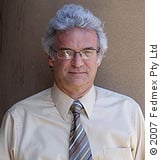Professor Scott Churchill, PhD
In March 2007, a trial began in the Supreme Court of New South Wales to determine defences and damages following a jury’s 2003 finding that the Australian Broadcasting Corporation had defamed Jeremy Griffith and Tim Macartney-Snape in a 1995 ABC-TV Four Corners television program. During the trial, four international scientific experts, including Professor Churchill (photo), took the stand in defence of the scientific and scholarly standard of Jeremy Griffith’s work.
From the report by Professor Churchill tendered at the trial:
‘My enthusiasm for Mr. Griffith’s work is based upon my appreciation of the sheer volume of the scientific literature with which he has familiarized himself, as evidenced by his writings from 1988 through 2006...Mr. Griffith’s perspective comes across as highly intelligent (for its capacity to understand both idiographically and comparatively the contributions of his fellow explorers) and philosophically sophisticated for his appreciation of the paradigmatic differences, whether explicit or implicit, represented by the differing individual positions of biologists and evolutionary psychologists whose own syntheses of existing knowledge stands as point of reference for his own scientific storytelling…That Mr. Griffith’s vision is well informed is clear enough from the constant succession of citations from the history of ideas that punctuate virtually all of the chapters that he has written, both before and after 1995. Certainly his earlier expositions (1988, 1991) of biological evolution, of the social behaviors of insects and primates, of the essential role of nurturing in the development of individual human and non-human primates (especially as grounded in his observations of bonobos), and his review (1991) of the information surrounding the emergence of consciousness in the human species would place Mr. Jeremy Griffith at the top of the class in any group of academics discussing human evolution, and I might well presume that he is as conversant with the scholarly traditions in the study of human evolution as anyone that I have known, layman or professional…I have recommended his more recent work to my students precisely for his razor-sharp clarifications of positions of contemporary authors like Edward O. Wilson [Sociobiology: The New Synthesis, 1975], Richard Dawkins [The Selfish Gene, 1976], and Robert Wright [The Moral Animal: Why We Are The Way We Are - The New Science of Evolutionary Psychology, 1994]. Griffith manages to summarize book-length expositions of these oftentimes obtuse and varying perspectives on human evolution with clarity and brilliance.’
Professor Churchill’s Profile:
Professor and former Chair of the Psychology Department, and Graduate Program Director for psychological studies, at the University of Dallas.
Professor Churchill has been teaching psychology (including classes in the ‘History of Psychology’, ‘Primate Studies’, ‘Chimpanzee Politics’, ‘People – Primates – Planet’, ‘Jane Goodall’s Roots & Shoots’, ‘Foundations of Psychology as a Human Science’) as well as philosophy at the University of Dallas for the past 25 years. Prior to that he taught at Duquesne University, Pittsburgh, for three years.
He is currently engaged in ongoing experiential study of interspecies communication with bonobos at the Fort Worth Zoo, and is a Director of and local co-ordinator for Jane Goodall’s ‘Roots and Shoots’ series. He has said ‘primate research can have far-reaching ramifications for understanding not only human behaviour and language development but the evolution of human behaviour from prehistoric days to the present’.
Professor Churchill has presented 70 papers at annual scientific and philosophical conferences since 1983 and has published approximately 40 articles in professional books and journals during the same period. He is currently the Editor-in-Chief of The Humanistic Psychologist, which is a division journal for the American Psychological Association (APA); prior to that he served as editor for Methods: A Journal for Human Science. Since the early 1990s he has been active in the APA’s Division of Humanistic Psychology and its Society for Theoretical and Philosophical Psychology, serving on their executive committees and editorial boards, as well as serving as division liaison to the APA’s Science and Education Directorates. He was promoted to full professor in 2003 and named a ‘Fellow’ of the APA in 2004.
He was also a participant in the 2002 Center for Theology and the Natural Sciences programs in San Jose, California (January 2002) and at Oxford University in England (July 2002), and based on that experience wrote a proposal for a course on ‘Sciences of Humanity and Nature in Dialogue with Religion: History and Current Controversies’.
Professor Churchill has a PhD in clinical psychology, an MA in psychology and a BS in biology.


